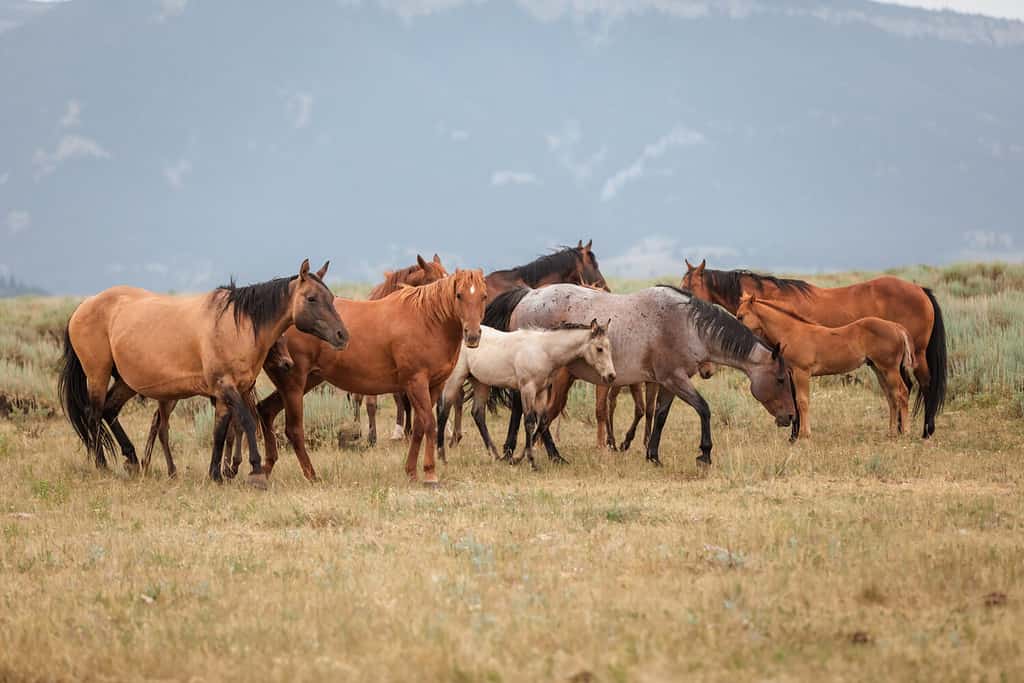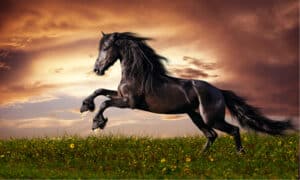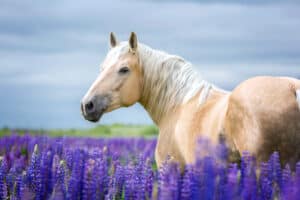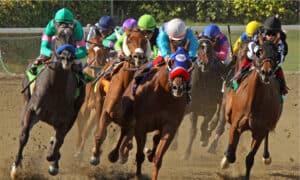If you’ve spent any time with horses, you might recognize the emotional, social, and cognitive depth of these animals’ lives. They form complex social relationships, learn intricate cues taught by humans, and seem to be able to quickly process various emotional states of both their own species and people.
In this guide, we’ll present some fascinating studies that help shed light on just how intelligent these amazing animals are.
Read on to learn more.
How Smart Are Horses: Measuring Intellect
The question of how smart are horses may seem like a simple one. But attempting to measure the intelligence of another species is quite the undertaking and can be marred by human-dominated biases.
Additionally, we have to ask what intelligence even is and how is it expressed. Is intelligence only the ability to solve cognitive problems? Or does intelligence encompass many aspects of how we navigate the world including emotionally, socially, cognitively, spatially, and creatively?
By expanding our perspectives on intelligence, we can appreciate the depth and diversity of intellect displayed by non-human animals.
How Smart Are Horses: A Summary
Overall, horses appear to particularly excel at spatial, social, cognitive, and emotional intelligence.
Domesticated since 3500 B.C., horses have spent thousands of years learning to coexist with humans. They can learn an astounding level of ridden and non-ridden tasks. With their high level of spatial and cognitive intelligence, these animals are often pushed to extreme displays of athleticism.
They also display intricate social intelligence. These animals excelling at forming social relationships with their own species and also humans and other domesticated animals.
The widespread use of equine-assisted therapy speaks to the ability of horses to emotionally connect with humans. And, as we’ll discuss further below, they appear to be able to read our emotional expressions quite well.
Cognitive Capabilities: Understanding the Horse’s Problem-Solving Skills and Learning Aptitude
The cognitive ability and learning aptitude of horses are immense. These animals have learned, often under high degrees of stress from unethical training methods, to perform a huge range of tasks. For thousands of years, humans have taken advantage of the intellect and athleticism of horses for use on battlefields, in sports, and in recreation. From learning to master extremely intricate dressage movements to jumping over 6-foot tall fences in a complex pattern under time pressure, horses have proven they have an enormous aptitude for learning. Unfortunately, after thousands of years, emphasizing a high standard of animal welfare, ethics, and horse-centered learning is only really starting to take off in some equine sports.
We can recognize the intellect of these wonderful animals not just in their vast trainability, but also in how they learn from each other and navigate the world in the wild. Researchers studying wild and feral horse bands have found that these animals rely heavily on their intellect. With this intellect, they keep each other safe, find food and water, evade predators, teach young members of the band, navigate social dynamics, and co-exist with other bands within a larger territory.

As social animals, horses rely on the ability to swiftly read and interpret communication within their species.
©Christy berry/Shutterstock.com
Intelligence in the Animal Kingdom: Comparing Horses to Other Species
Comparing intelligence shouldn’t be an apples-to-apples question of what species is smarter. Rather, we can observe how intelligence presents itself in various ways across the animal kingdom. As prey animals who live socially, the ability to problem-solve collectively are crucial to the survival of horses.
In comparison, a solitary species like a leopard may rely more on individual cunning and cognitive calculations. For example, while feral and wild horses depend largely on collaboration and group movements to survive, a leopard may rely more on individual calculations of how to use camouflage to ambush prey or how to position itself above an animal for the ideal striking position.
How Smart Are Horses: What the Research Shows
With horses, some studies have focused on presenting cognitive problems while others have looked at the ability of horses to display self-awareness and to read and react to human emotions.
One question that many researchers are interested in is what species show evidence of self-awareness? In this context, researchers are talking about an animal’s ability for self-directed awareness and knowledge. The test most commonly used to assess this is called the Mirror Self-Recognition test (MSR). Research has proven that horses have the ability to recognize themselves in mirrors, a capability almost exclusively demonstrated by social species.
In addition to their capacity for self-awareness, research also supports that horses can distinguish human emotions, possibly through multiple sensory avenues, and even remember previous emotional states of an individual.
Due to their widespread use in sport and work, it’s evident that horses can reliably learn a wide range of ridden and non-ridden cues. A novel study in 2009, however, proved that not only can horses reliably learn concepts and apply them, but they can also remember those concepts years later without consistent training or application. This study taught three horses to categorize various familiar and novel items based on a variety of rules. Then, 6, 7, and 10 years later, the horses were re-presented with this learning experiment with no training in between. All horses were able to successfully and quickly recall what they learned years prior.

In addition to their cognitive skills, horses are highly curious, and emotionally intelligent beings who can process, interpret, and remember human emotions.
©vprotastchik/Shutterstock.com
The photo featured at the top of this post is © ODIN Daniel/Shutterstock.com
Thank you for reading! Have some feedback for us? Contact the AZ Animals editorial team.







